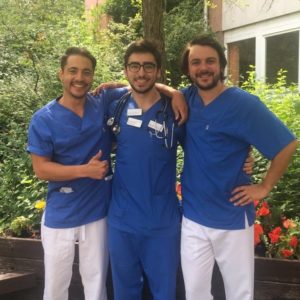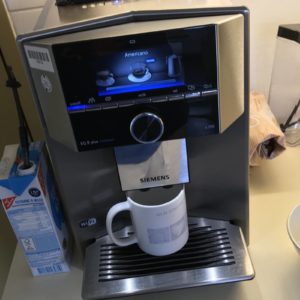
This summer, I worked at a hospital in Berlin for an internship through the Summer Work Program (SWP), a German-department summer activity similar to IIP. As I walked in, I had no idea what department I was supposed to be in, who I was supposed to talk to, or what my responsibilities would be. I desperately introduced myself to people in varying colors of scrubs, hoping that someone would recognize my name as an intern who was supposed to be there. After a half hour I found a tiny HR office, and they loosely directed me to the general surgery department, where my new colleagues’ responses weren’t any more comforting: “Ah, hello Artem! Weren’t you supposed to arrive here next month?” (My name is not, in fact, Artem).
At this point I was worried – did I even have an internship this summer? After explaining to them that I was an intern from Princeton they finally realized who I was, and despite this initial bureaucratic nightmare, my experience turned out to be incredibly rewarding. In fact, in many ways, it was because of this lack of organization and structure that my internship felt special: in this post, I’ll explain how I catered my experience to my interests and what my days looked like at the hospital.
No one ever clarified to me if I needed to arrive or leave the hospital at a certain time each day, or even what exactly I would be doing. Thus, I decided I would shadow the 6th year medical students in their praktisches Jahr – practical year, or the year they rotate various medical departments to discover their own interests. I followed them when they did patient entrance exams, accompanied doctors as they performed ultrasounds, or headed into the operating room. As students themselves, they were the most accommodating to me, often explaining medical concepts and helping me improve my German vocabulary. They also served as emotional supports, especially during my interactions with the doctors and surgeons who, unlike the medical students, were inclined to ask me to do things that often exceeded my experience and abilities. That is, when a surgeon – either in the OR or the clinic – asked that I retrieve a patient’s file (where are they?), hand them a pair of sterile tweezers (not as easy as it sounds), or write up a report on a patient’s entrance exam (how do I format it?), the medical students were there for me.
Thus, I became accustomed to the daily schedule of the general surgery department: at 8:00, I attended a meeting to discuss CT-scans and pathologies; at 8:30, the nurse intern took the blood pressure and vitals of each patient; at 11:30, Dr. Finger (who demanded I call her Lisa) regularly grabbed an Americano from the coffee maker; and at 3:30, I sat in on another meeting to discuss surgical outcomes.

It was through learning this routine and knowing when to talk to the medical staff that I was able to develop positive relationships with my colleagues and learn new skills. For example, knowing that Dr. Finger regularly took her break at 11:30, I struck up a conversation with her: we talked about my internship experience thus far and she quickly offered to teach me how to stitch wounds. She later showed me how to feel for tumors in various appendices (like colons removed surgically from patients) and set up a laparoscopy demo machine for me to practice on, a tool that simulates a specific type of non-invasive surgery and requires a fine degree of motor control. I talked to the nurse intern just before her regular rounds and she taught me the procedure for taking vitals and recording them in databases in the mornings. Just after a meeting, I asked the chief of surgery a question about CT-scans I had recorded in my notes and he took the time to clarify the technique and its application for me. After a lunch conversation with a medical student, I learned that we were both interested in neuroscience: he subsequently introduced me to the chief of neurosurgery, from whom I learned a number of medical snippets while I watched him operate on a herniated disk in a patient’s neck.
While scary at first, my internship ended up being unforgettable and quite personalized to my interests. After learning the ins and outs of the daily routine, I was able to make my presence known and interact with medical personnel without bothering them in their busiest moments. Because my internship lacked structure and preplanned tasks, my colleagues helped me tailor my experience to my interests, truly going out of their way to ensure I was able to do anything and everything I wanted to during my time at St Joseph’s Hospital. Whether it be an internship, independent work, or even a project assigned to you for a class, don’t be afraid of uncertainty and lack of structure. Instead, embrace these qualities to cater experiences to your interests.
–Kamron Soldozy, Natural Sciences Correspondent

